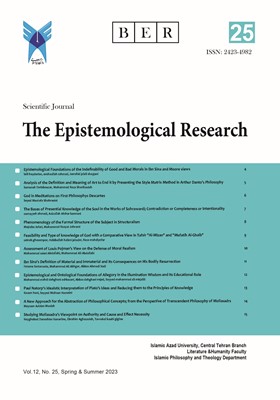A New Approach for the Abstraction of Philosophical Concepts; from the Perspective of Transcendent Philosophy of Mollasadrs
Subject Areas : Epistemological researches
1 - --
Keywords: Abstraction, substantive concept, philosophical concept, immediate knowledge,
Abstract :
How to abstract concepts is one of the important issues of epistemology. Among the Muslim philosophers, Allameh Tabataba'i is the first Muslim thinker who has examined this issue independently. Her students - including Misbah Yazdi - have also raised different opinions in this field. According to Allameh, philosophical concepts do not have an objective reference, and a different explanation should be found for the origin of their abstraction (compared to the origin of the abstraction of essential concepts). In his book "Principles of Philosophy and Method of Realism", he believes that "judgment" is the origin of the abstraction of these concepts. Misbah Yazdi, following his teacher, is looking for a way to explain the origin of the abstraction of these concepts, because he considers these concepts to have no objective reference. According to him, the Consciousness of inner states, in addition to mental explorations, is the source of the abstraction of these concepts. In the following article, I have shown that these solutions are not without problems. Also, by examining two philosophical concepts (the concept of Consciousness and effect), I showed that these two concepts have "objective reference" like the substantive concepts and are directly obtained from the immediate knowledge.
ابراهیمی دینانی، غلامحسین. (1380). قواعد کلی فلسفی در فلسفه اسلامی، ج 2 و ۳، تهران، پژوهشگاه علوم انسانی و مطالعات فرهنگى.
ابنسینا، حسین بن عبدالله .(1404). التعلیقات، قم، مکتب الإعلام الإسلامی. مرکز النشر.
همو .(بیتا). رسالة فی الحدود (الرسائل فی الحکمة و الطبیعیات)، قاهره، دار العرب.
ایزدی، محسن .(1398). تحلیل هستی شناختی و معرفتشناختی معقولات ثانیه فلسفی در حکمت متعالیه (با تأکید بر مفهوم وجود)، پژوهشهای هستی شناختی، شماره 15، ص 229-248.
زنوزی، عبدالله بن بیرمقلی بابا خان. (1381). لمعات الهیه، تهران، مؤسسه پژوهشی حکمت و فلسفه ایران.
سهروردی، یحیی بن حبش. (1372). المشارع و المطارحات (مجموعه مصنفات شیخ اشراق)، ج ۱، تهران، وزارت فرهنگ و آموزش عالی. موسسه مطالعات و تحقیقات فرهنگی (پژوهشگاه).
صدرالدین شیرازی، محمد بن ابراهیم. (1360). الشواهد الربوبیة فی المناهج السلوکیة، تهران، مرکز نشر دانشگاهی.
همو. (1363). مفاتیح الغیب، تهران، مؤسسه مطالعات و تحقیقات فرهنگی. انجمن اسلامی حکمت و فلسفه ایران.
همو. (1366). شرح أصول الکافی، ج ۱، تهران، وزارت فرهنگ و آموزش عالی. موسسه مطالعات و تحقیقات فرهنگی (پژوهشگاه).
همو.(1368). الحکمة المتعالیة فی الأسفار العقلیة الأربعة، ج 1 و 3 و 6 و 7، قم، مکتبة المصطفوی.
همو. (بیتا). المبدأ و المعاد، [بی جا]، [بی جا].
طباطبایی، محمدحسین . (1386). نهایة الحکمة، ج 1، قم، مؤسسه آموزشی و پژوهشی امام خمینی(ره). مرکز انتشارات.
همو. (بیتا). اصول فلسفه و روش رئالیسم، ج 2، تهران، صدرا.
عمادالدوله، بدیع الملک بن امام قلی. (1363). المشاعر، تهران، طهوری.
قوام صفری، مهدی .(1388). مابعدالطبیعه چگونه ممکن است، تهران، انتشارات پژوهشگاه فرهنگ و اندیشه اسلامی، چاپ دوم.
مصباح، محمدتقی .(1366). آموزش فلسفه، ج 1، تهران، سازمان تبلیغات اسلامی. معاونت فرهنگی.
موسوی راد، سیدجابر . (14/6/1402). «نقدی بر تقسیمبندی رایج از معقولات اولی و ثانوی»، پایگاه اطلاعرسانی مجمع عالی حکمت اسلامی، 1397، hekmateislami.com.
یزدان پناه، یدالله .(1389). حکمت اشراق، تحقیق و نگارش دکتر مهدی علی پور، ج 1، قم، پژوهشگاه حوزه و دانشگاه.
_||_
